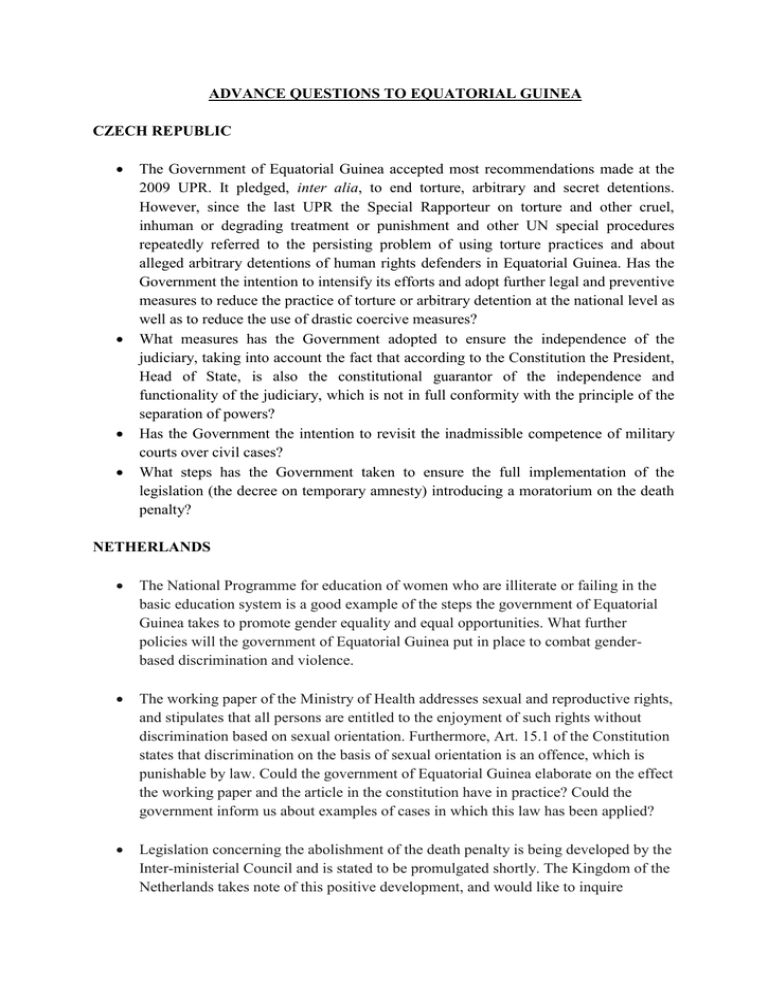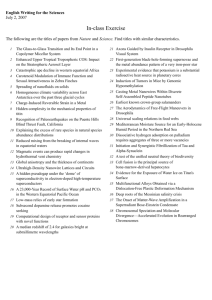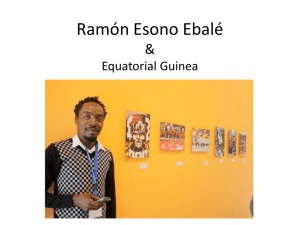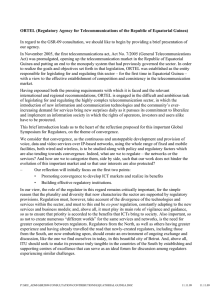
ADVANCE QUESTIONS TO EQUATORIAL GUINEA
CZECH REPUBLIC
The Government of Equatorial Guinea accepted most recommendations made at the
2009 UPR. It pledged, inter alia, to end torture, arbitrary and secret detentions.
However, since the last UPR the Special Rapporteur on torture and other cruel,
inhuman or degrading treatment or punishment and other UN special procedures
repeatedly referred to the persisting problem of using torture practices and about
alleged arbitrary detentions of human rights defenders in Equatorial Guinea. Has the
Government the intention to intensify its efforts and adopt further legal and preventive
measures to reduce the practice of torture or arbitrary detention at the national level as
well as to reduce the use of drastic coercive measures?
What measures has the Government adopted to ensure the independence of the
judiciary, taking into account the fact that according to the Constitution the President,
Head of State, is also the constitutional guarantor of the independence and
functionality of the judiciary, which is not in full conformity with the principle of the
separation of powers?
Has the Government the intention to revisit the inadmissible competence of military
courts over civil cases?
What steps has the Government taken to ensure the full implementation of the
legislation (the decree on temporary amnesty) introducing a moratorium on the death
penalty?
NETHERLANDS
The National Programme for education of women who are illiterate or failing in the
basic education system is a good example of the steps the government of Equatorial
Guinea takes to promote gender equality and equal opportunities. What further
policies will the government of Equatorial Guinea put in place to combat genderbased discrimination and violence.
The working paper of the Ministry of Health addresses sexual and reproductive rights,
and stipulates that all persons are entitled to the enjoyment of such rights without
discrimination based on sexual orientation. Furthermore, Art. 15.1 of the Constitution
states that discrimination on the basis of sexual orientation is an offence, which is
punishable by law. Could the government of Equatorial Guinea elaborate on the effect
the working paper and the article in the constitution have in practice? Could the
government inform us about examples of cases in which this law has been applied?
Legislation concerning the abolishment of the death penalty is being developed by the
Inter-ministerial Council and is stated to be promulgated shortly. The Kingdom of the
Netherlands takes note of this positive development, and would like to inquire
whether international human rights obligations of Equatorial Guinea have been taken
into account in the development of the legislation.
NORWAY
Norway would be grateful if you would provide information as to how civil society
was consulted in the preparation of your national report and which role civil society
will play in the follow-up of the UPR.
Norway is encouraged to see Equatorial Guinea implementing a moratorium on death
penalty. What other commitments are you considering in order to abolish death
penalty?
Equatorial Guinea acceded to the Convention on the Rights of the Child in 1992.
What steps have been taken to ensure that national legislation prohibits corporal
punishment of children in all settings, including the home, as recommended by the
Committee on the Rights of the Child?
UNITED KINGDOM
How does Equatorial Guinea plan to improve the transparency of asset holdings by
Ministers and senior civil servants?
What measures is Equatorial Guinea taking to encourage fair access to funding to all
political parties, and open debate and a right to assembly in the run up to the Presidential
elections in 2016?
Equatorial Guinea is ranked 163rd on Transparency International’s Corruption List. What
steps are being taken to address this?
Equatorial Guinea is ranked 161st on Transparency International’s Press Freedom List.
What steps are being taken to address this?
Could you please tell us what steps Equatorial Guinea is taking to eliminate torture of
detainees by the police, and what measures are being put in place to ensure the judicial
system is independent from the role of President?




